Koalas & their Advanced Digestive Mechanisms
Koalas possess a highly advanced digestive system which works in its own unique way for koalas. Koalas only eat Eucalyptus leaves and these leaves are full of poisons such as the cyanide compounds. On the other hand; these poisons hardly have any adverse effect on koalas as their digestive system is advanced enough to digest the Eucalyptus poisons and also release energy for koalas.
Koalas have a very advanced digestive system which helps it to survive on one of the poisonous foods of Eucalyptus leaves.
A normal herbivore may simply die if it will be fed on the Eucalyptus diet while humans may simply fall ill or even die too merely by taking it in smaller proportions. However; koalas live their entire lifespan on the Eucalyptus leaves and their advanced digestive system holds the key in this regard. Let's learn further about the digestive system of koalas and explore its key features which make the koalas' digestive system different from others.
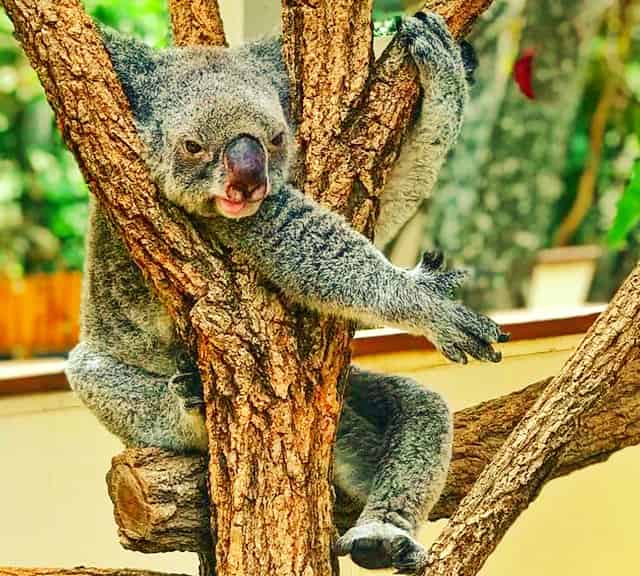
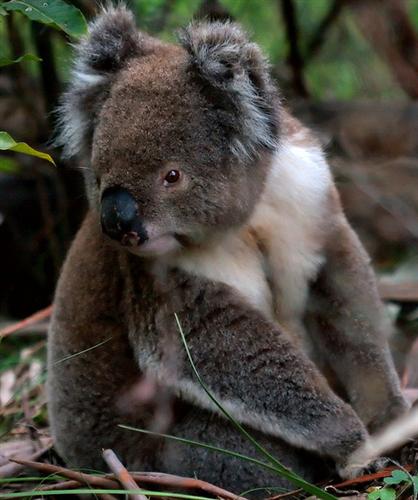
The basic process of the koalas' digestive system functions in the similar way like the usual digestive system of the other animals (most of them). However; the digestive system of koalas possesses certain specialized mechanisms within it which makes it highly advanced and unique as compared to the other animals.
Koalas digestive system is almost similar to other animals but it is the presence of the special mechanisms within their stomach which help them to extract energy from the Eucalyptus leaves.
Their digestive system is similar in working to other animals because just like all herbivores, koalas first chew their food, pass them to their stomach from where it first goes to the small intestine and then to caecum and finally to the large intestine for excretion. Nevertheless; it is the presence of the specialized mechanisms within different parts of their digestive system which help koalas to produce energy for their bodies.
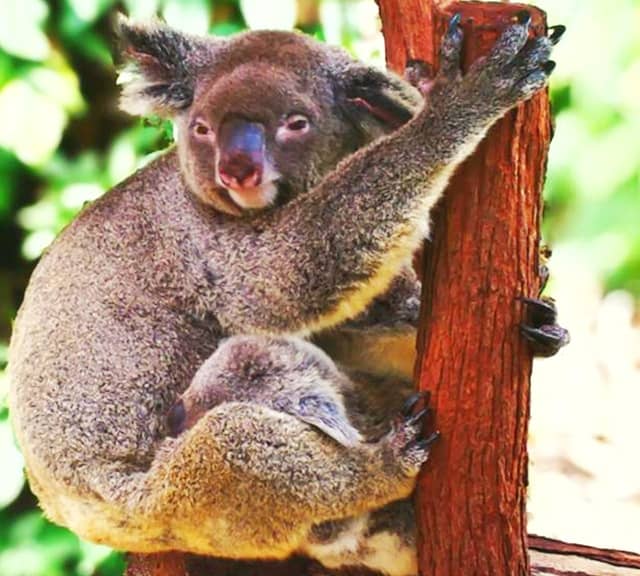
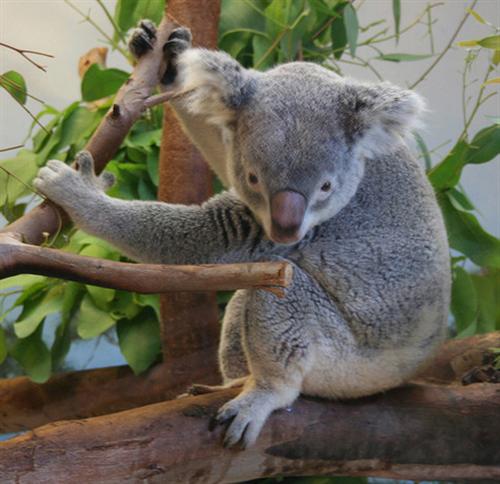
When koalas eat the Eucalyptus leaves through their mouth, the chewed Eucalyptus leaves directly reach their stomach via esophagus pipe. It is believed that koalas extract much of their energy requirements from their stomach. Koalas' stomach and the small intestine have special cellular contents which help koalas to absorb energy from the chewed leaves.
Koalas' chewed food is mostly digested from their stomach and the small intestine through special cellular contents. Koalas do not rely much on extracting energy from their hindguts.
However; unlike other animals, koalas do not rely much on bacterial fermentation process within their hindguts despite the fact that koalas have a very large caecum and proximal colon which is also known as the fermentation chamber. Koalas only fulfill less than 10% of their energy requirements through their hindguts.
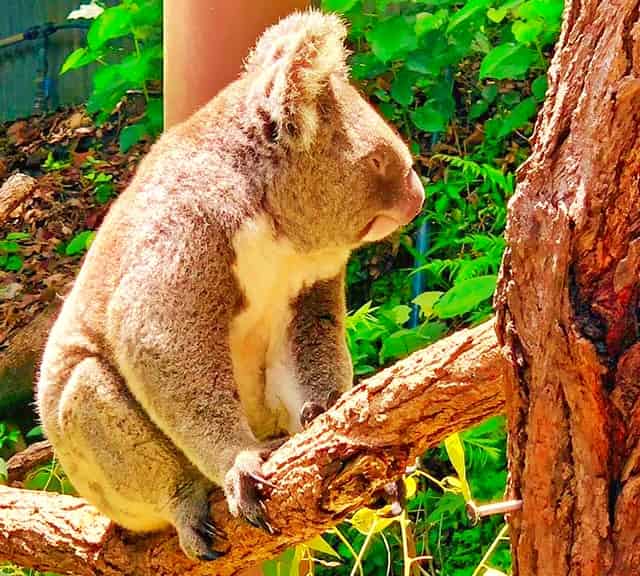
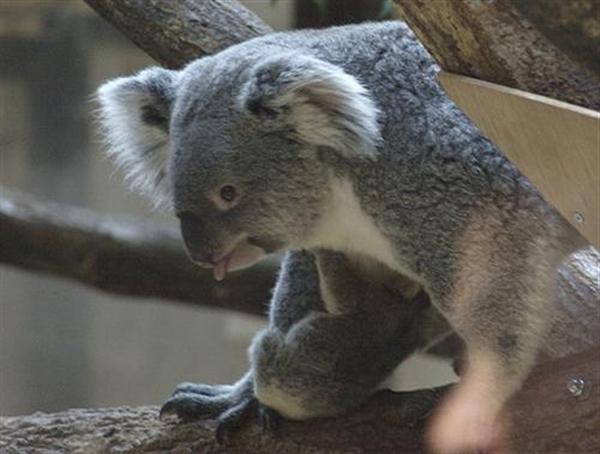
According to the koala experts; only the smallest food particles (finely chewed Eucalyptus leaves) are retained by the koalas' hindgut for the fermentation process. This fermentation process releases very little energy and in the case of the Eucalyptus leaves even lesser amount of energy is produced for koalas from the fermentation chamber.
During the process of digestion, the finely chewed particles are retained within the hindgut of koalas while larger food particles are passed on to the large intestine, where water contents are absorbed.
On the other hand; the larger food particles which are not fit for digestion are passed into the larger intestine from where they finally reach for its excretion outside the body from rectum and anus. Koalas' large intestine also helps them to absorb water contents as well from the indigestible food.
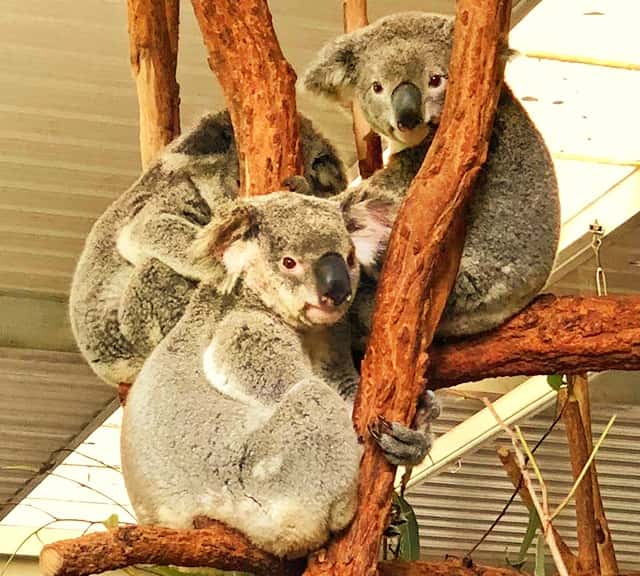
Another key process that chiefly influences the digestive system of koalas is called merycism. The process is somewhat similar to the rumination process within the herbivore mammals. During this process koalas regurgitate the food contents from their stomach and rechew them as the finely chewed contents. Remember; only properly chewed contents and smallest of particles release energy for koalas during digestion while the bigger food contents are passed on to the larger intestine for excretion.
Merycism is also one of the key processes within the digestive system of koalas. In Merycism koalas regurgitate their food contents and convert them into the smallest finely chewed contents for proper digestion.
The smallest food contents are also retained and stored by koalas within their hindgut for energy (Only 10% of their body energy is retained through hindgut). Therefore; the process of merycism specifically helps koalas to have proper digestion and extract maximum energy from the finely chewed Eucalyptus leaves.
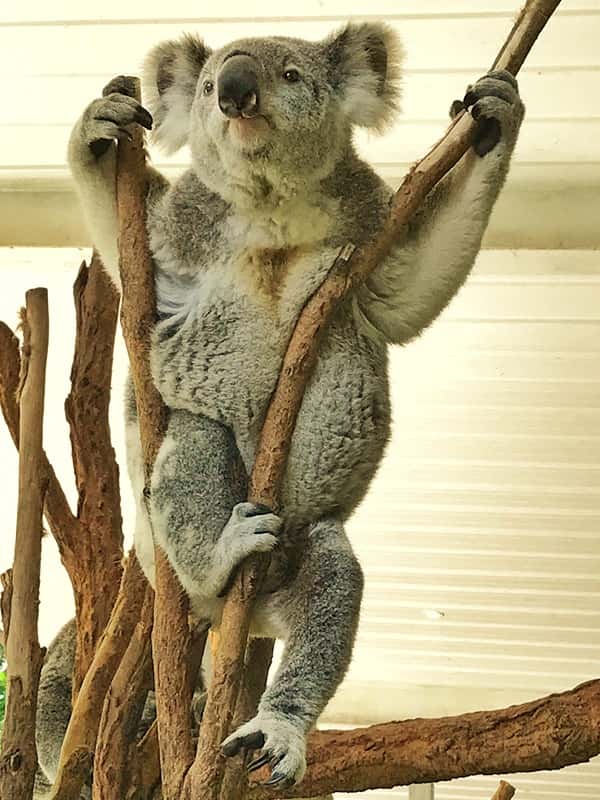
If we conclude the overall digestive system of koalas, it looks quite similar to the other animals. However; the ability of this digestive system to extract most of the energy from stomach, the process of merycism and the storage of finely chewed food contents within their hindguts make digestive system of koalas a bit advanced as compared to the other animals.
Even though koalas possess a highly advanced digestive system which helps them to extract energy from the Eucalyptus leaves, they still have to rest more than 20 hours per day to conserve their body energy.
Lastly; the food metabolism of koalas is very slow as compared to the other animals. Lastly; despite the presence of an advanced digestive system, the energy extracted from the Eucalyptus leaves only allow koalas to have an active lifestyle for 3 to 4 hours per day while for almost 20 to 21 hours they mostly sleep to conserve their body energy.
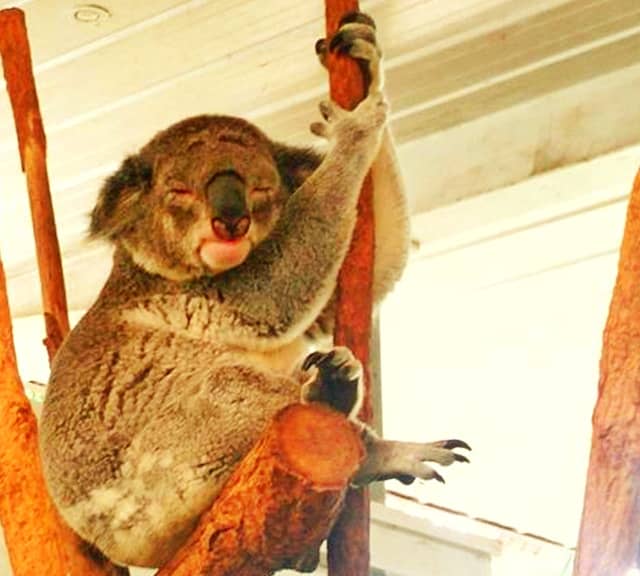
Liger Articles
Marsupials vs. Placental Mammals
Koalas are most popular animals in Australia
Koalas are more popular as compared to Kangaroos
Koalas and their Dominant Nose
Button Shaped Fascinating Eyes of the Koalas
Core Recognizing Features of Koalas
Koalas are the largest tree climbing Mammals in Australia - Koalas as Arboreal
Sizes of Koalas from Queensland, Australia
Sizes of Koalas from Australia's Victorian Origin
Difference between Queensland and Victorian Koalas
Average Weights of Male Koalas
Weighing Male vs Female Koalas
Male Koalas have Loudest of voice among all Australian Mammals
Origin of Koalas & their Evolution
Koalas Population Increased at the end of 20th century
Historical Evolution of the Koalas - A Physical Perspective
Koalas and their Aboriginal and Native Names
It Took 10 years for Aboriginal Australians to Spot and Recognize Koalas
Koalas Live Hardest and Toughest Lives Among all animals
Koalas Tooth Decay through its Abrasive Diet
Koalas Diet is Fully Poisonous and Toxic
Koalas' Food Eucalyptus has Lower Nutrition
Koalas have Lower Energy Levels
Koalas - When Occasionally Spotted on other Leaves for their Food
Why Koalas drink little or no Water?
Koalas & their Advanced Digestive Mechanisms
Why Koalas Sleep more than 20 Hours a Day?
Koalas Lack Energy and Strength
Koala's Tooth from Growth till Tooth Decay
Young Koalas are Better Chewers as Compared to Mature and Elderly Koalas
Why Most Koalas Die of Starvation?
Heat Exhaustion and Heat Strokes among Koalas
Do Koalas lack Intellectual Abilities?
Koalas and their Sense of Smell
Koalas Love Fresh Eucalyptus Leaves as their Food
Koalas' Eucalyptus Leaves' Preferences during summers and Winters
Koalas' Preference for Leaves Having Higher Nitrogen Levels
Koalas Prefer Big Eucalyptus Trees and Love to Stay at Trees' tops.
Koalas Prefer to Live in Areas that have Good Soil and Fertile Lands
Koalas' Per Day Food Consumption
Koalas Food Consumption Depends upon their Body Size
Lactating Female Koalas Consume More Food as Compared to the Normal Female Koalas
Koalas Consume More Food during Winters as Compared to Summers
Female Koalas are very Selective Regarding their Leaf Selection and Food Consumption.
A Baby Koala Joey Lives in her Mother's Pouch for 8 to 9 Months
Gestation Period within Female Koalas
Breeding Behaviors of the Female Koalas
The Size of the Baby Koala Joey at the time of its Birth
Weight of the Baby Koala Joey at the Time of its Birth
At Birth the Baby Koala Joey Travels from Cloaca into their Mother's Pouch
Newborn Koala Joeys have Well-Established Sense of Smell
Koala Joey keeps his Head Inside its Mother's Pouch for 6 Months
Complete Shape and Body Development of the Koala Joey
Pap - The first solid food of the Koala Joeys
When Does Tooth Emerge for Baby Koala Joey?
Aggressive Behavior of Mother Koalas towards their Joeys
Queensland Offers Less Nutritional Values for Koalas
How long does Koalas live? Age of the Koala
Female Koalas Live More than Male Koalas
What is the Average Age of the Male Koala?
Average Ages of the Female Koalas
For How Long a Female Koala can Give Birth to the Koala Joeys?
How many times female Koalas give birth?
Koalas and Australia's Bushfire
Koalas' fur quickly gets rid of rain water
Koalas Resting and Sleeping Postures and Positions during the Hot Summer Seasons
Winter Season and Sleeping Postures of Koalas
Koalas' Urination during Summer and Winter Seasons
Koalas and their Specialized Claws
How does a Koala regulate its Body Temperature?
Food Consumption and Feeding Timings of the Koalas
Koalas Always Prefer Eucalyptus Leaves from the Tree top
How does a Koala Grooms itself?
Koalas' Territories and ranges within Australia's Victorian Areas
Koalas' Territories and Ranges within Australia's Queensland Areas
Behavior of the Alpha Dominant Male Koala
Aggressiveness of Female Koalas
Scent Marking Behavior of the Male Koalas
Mating Strategy of the Male Koalas
Fights and Territorial Encounters of Male Koalas
Sounds and Vocalizations of Male Koalas
Sounds and Vocalization of the Female Koalas
Koalas and their Facial Expressions
Breeding Ages of the Male and Female Koalas
Factors Influencing the Success of Koalas' Fertility Rates
Behavior of the young and adolescent Koala Joey
When Does a Mother Koala Says Goodbye and Leaves the Young Koala Joey?
Playful Behavior of the Young Koala Joeys
Koalas - Mating Season and Mating Months
Koala Informationen, Bilder, Neuigkeit, und Erforschung
Коала - сумчатый млекопитающий